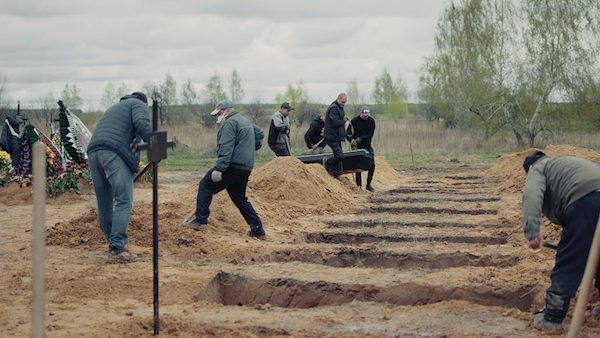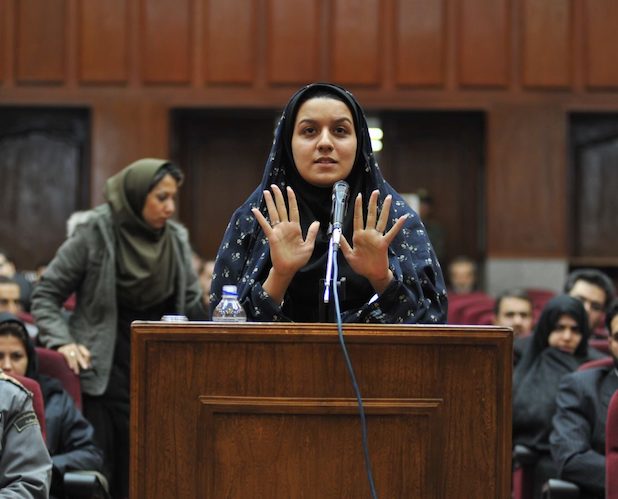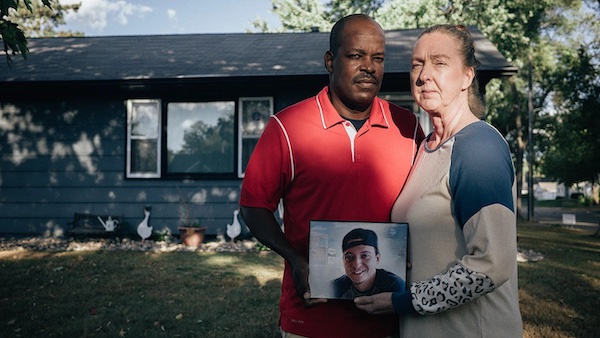Doc Talk: 2023’s Human Rights Watch Film Festival — Inviting Outrage and Action
By Peter Keough
Reasons to be outraged and hopeful at this year’s Human Rights Watch Film Festival.
Sadly, the past year has been rife with material suitable for features programmed in the Human Rights Watch Film Festival, which can be seen until June 11 in person at Film at Lincoln Center and the IFC Center in New York City or virtually online. From Ukraine to Iran to the United States, here are three glimpses into calamities that should stir outrage — and action.

A scene from Mila Teshaieva and Marcus Lenz’s When Spring Came to Bucha. Photo: courtesy of Marcus Lenz
For that is what is most inspiring about these films, that the victims of injustice and oppression seen in them respond not with despair, but solidarity and resolve. Mila Teshaieva and Marcus Lenz’s When Spring Came to Bucha (2022) shows the aftermath of the Russian occupation of that town outside of Kiev, the site of massive destruction, numerous civilian casualties, and, as would soon be uncovered, Russian atrocities and war crimes. Yet the people shown in the film don’t appear to be despondent or vengeful but focused on working together to repair the destruction and restore the community.
They include a weary city official in charge of recovering the dead and establishing their identities; he reckons that until the government chips in he’ll have to pay for some of the needed coffins. A schoolgirl sits in a classroom alone except for the teacher; everyone else was killed or is a refugee attending the class online. She expresses gratitude that her school was spared and later at home laughs after flinching at an explosion. It’s our boys, she notes, detonating booby traps. A woman sits in the basement that is now her home saying that though there is no TV, electricity, or running water, it is still everything she and her husband need.
The film achieves eloquence and power through restraint and a detached observational style reminiscent of Mantas Kvedaravičius’s posthumous portrait of another Ukrainian city under siege, Mariupolis 2. Bucha opens with footage taken shortly after the Russians retreated on March 31, 2022. A solitary soldier walks past piles of charred wreckage and people line up for food boxes alongside a building with every window blown out. A soldier reassures a frightened elderly woman that she is safe, “everything is clean now,” and then a cut is made to a corpse in the street half covered with a carpet. A couple walk through the ruins carrying a bag of rations. They smile and say, “Glory to Ukraine!”

A scene from Steffi Niederzoll’s Seven Winters in Tehran. Photo: Courtesy of Made in Germany
Steffi Niederzoll’s infuriating, exacting Seven Winters in Tehran begins in Tehran, Iran, in July 2007 when 19-year-old Reyhaneh Jabbari, an interior designer with a seemingly bright future ahead of her, met with a plastic surgeon who supposedly wanted to hire her to rehab his office space. Instead, he tried to rape her. Locked in his apartment, Jabbari grabbed a knife and stabbed him to death. Even in an American court Jabbari might have had a hard time getting a fair trial. She didn’t stand a chance in the Iranian sharia justice system, especially since the attempted rapist was a crony of the Republican Guards.
Nonetheless, as the title indicates, it took seven years to bring the case to trial, find Jabbari guilty, sentence her to hang, and finally execute her. During this time Jabbari grew from a naïve and anonymous victim of the system to an outspoken international cause célèbre and a role model to other young women chafing under patriarchal oppression. Her parents and sisters changed: at first helpless and aggrieved onlookers, they became politically savvy fighters for justice. Drawing on interviews with Jabbari’s family and readings from her letters by Zar Amir Ebrahimi, the actress who portrayed a similar victim of Iranian jurisprudence in Ali Abbasi’s Holy Spider (2022), Niederzoll puts together a coldly thorough indictment of tyranny as well as a heartbreaking portrait of a family tragedy.

A scene from Rachael Dyer and Scott Ruderman’s Pay or Die.
Our judicial system might be an improvement over that in Iran, but can the same be said about health care? Perhaps not if you are diabetic and dependent on insulin, as Rachael Dyer and Scott Ruderman demonstrate in their comprehensive and compelling Pay or Die (2023). Take, for example, Nicole and James, whose son Alec died at 26 because he had aged out of his parent’s health insurance plan and couldn’t afford the insulin he needed for his type 1 diabetes. Or Sandra and her 11-year-old daughter Emma, both of whom also have type 1 diabetes. Because of the cost they became homeless and for a while lived in their car in a Walmart parking lot. Meanwhile, across the border in Canada, a vial of insulin that costs $300 in the US goes for around 20 bucks.
Bear in mind that Sir Frederick Banting, the Canadian scientist who discovered the drug in 1923, only charged $1 for the patent, saying, “Insulin does not belong to me, it belongs to the world.” Today — in this country, at any rate — it belongs to the pharmaceutical companies and the health insurance bureaucrats who profit from the misfortunes of others.
But Sandra and Emma didn’t give in — they supported one another, survived, and prevailed. And they dedicated themselves to changing the system so that no other family would have to endure their pain. The pair became activists and mobilized a campaign that resulted in the passage of a law in Michigan named after their son that would provide a safety net for those who can’t afford the life-saving drug.
Perhaps in part because of their efforts, the three pharmaceutical companies who monopolize the insulin supply in this country dropped their prices earlier this year. But as is pointed out at the end of the film, this move was voluntary and could be reversed. Only federal laws will guarantee that the commonsense health care enjoyed by most of the world is a recognized right here as well.
Peter Keough writes about film and other topics and has contributed to numerous publications. He had been the film editor of the Boston Phoenix from 1989 to its demise in 2013 and has edited three books on film, most recently For Kids of All Ages: The National Society of Film Critics on Children’s Movies (Rowman & Littlefield, 2019).
Tagged: Doc Talk, Human Rights Watch Film Festival, Marcus Lenz, Rachael Dyer, Scott Ruderman, Seven Winters in Tehran, Steffi Niederzoll
